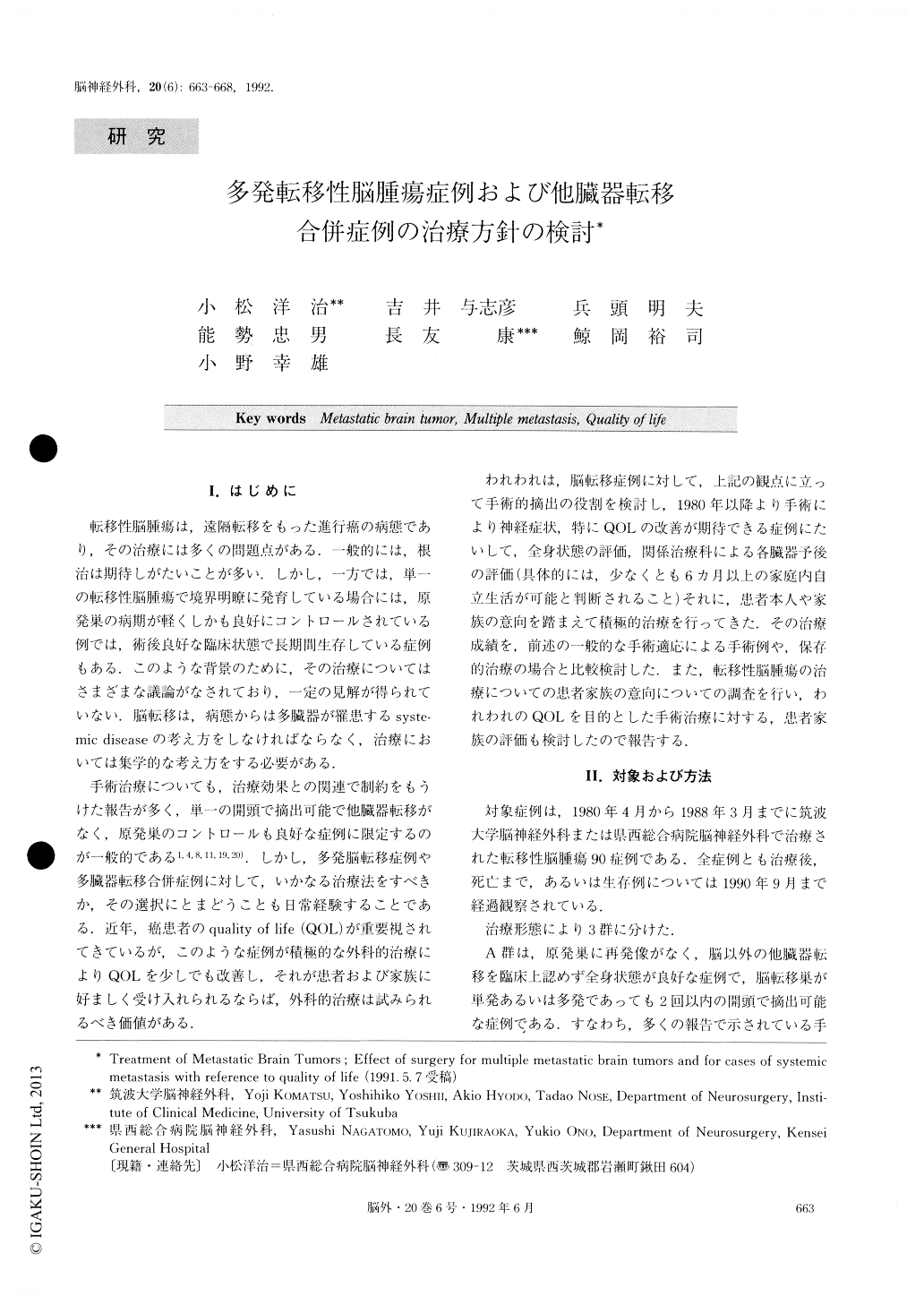Japanese
English
- 有料閲覧
- Abstract 文献概要
- 1ページ目 Look Inside
I.はじめに
転移性脳腫瘍は,遠隔転移をもった進行癌の病態であり,その治療には多くの問題点がある.一般的には,根治は期待しがたいことが多い.しかし,一方では,単一の転移性脳腫瘍で境界明瞭に発育している場合には,原発巣の病期が軽くしかも良好にコントロールされている例では,術後良好な臨床状態で長期間生存している症例もある.このような背策のために,その治療についてはさまざまな議論がなされており,一定の見解が得られていない.脳転移は,病態からは多臓器が罹患するsyste—mic diseaseの考え方をしなければならなく,治療においては集学的な考え方をする必要がある.
手術治療についても,治療効果との関連で制約をもうけた報告が多く,単一の開頭で摘出可能で他臓器転移がなく,原発巣のコントロールも良好な症例に限定するのが一般的である1,4,8,11,19,20).しかし,多発脳転移症例や多臓器転移合併症例に対して,いかなる治療法をすべきか,その選択にとまどうことも日常経験することである.近年,癌患者のquaiity of life(QOL)が重要視されてきているが,このような症例が積極的な外科的治療によりQOLを少しでも改善し,それが患者および家族に好ましく受け入れられるならば,外科的治療は試みられるべき価値がある.
われわれは,脳転移症例に対して,上記の観点に立って手術的摘出の役割を検討し,1980年以降より手術により神経症状,特にQOLの改善が期待できる症例にたいして,全身状態の評価,閲係治療科による各臓器予後の評価(具体的には,少なくとも6カ月以上の家庭内自立生活がll∫能と判断されること)それに,患者本人や家族の意向を踏まえて積極的治療を行ってきた.その治療成績を,前述の一般的な手術適応による手術例や,保存的治療の場合と比較検討した.また,転移性脳腫瘍の治療についての患者家族の意向についての調査を行い,われわれのQOLを目的とした手術治療に対する,患者家族の評価も検討したので報告する.
To assess the efficacy of surgical resection of brain metastases from patients with multiple brain metastases or/and with other systemic metastases, the authors analysed treatment results of 90 cases of metastatic brain tumors. The patients were divided into three groups.
Group A (nine cases) : Patients with single brain tumor and their primary cancers were well controlled. Their brain tumors were removed surgically and fol-lowed by radiation. Their mean survival time was 17.0 months, and 14.6 months were independent (Karnofsky score70) in cases of lung cancer. Five patients (55.6%) improved by treatment.
Group B (21 cases) : Patients with multiple brain metastases or/and with systemic metastases. Their brain tumor (s) which gave rise to neurological symp-toms were surgically removed in order to improve their quality of life. In cases of lung cancer, mean survival time was 9.5 months and 7.1 months were independent. 11 patients (52.3%) improved by treatment.
Group C (60 cases) : Patients treated conservatively. Their mean survival time was 4.9 months and 2.7 months were independent in cases of lung cancer. Only 13 patients (21.7%) improved by treatment. However 23 (38.3%) deteriorated in their quality of life during treatment. Two patients of this group had single brain tumor and their primary cancers were controlled well. They refused surgery. Their mean survival time was 13.0 months, and 7.0 months were independent. These times were statistically shorter than group A. Seven pa-tients had similar systemic and neurological states as those in group B. Their mean survival time was 5.0 months and 3.0 months were independent. These times were also statistically shorter than those in group B. The authors made investigations into the patients' or their families' desires for treatment. Improvement of quality of life was desired, and they wanted surgical treatment when there was some chance of success.
It was concluded that the surgical removal of metastatic brain tumors should be considered for not only patients of single metastases but also patients with multiple brain metastases and/or systemic metastases when the surgical removal of brain tumor could im-prove the quality and longevity of their life.

Copyright © 1992, Igaku-Shoin Ltd. All rights reserved.


